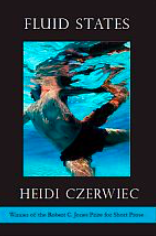 There’s a lot of talk these days about books as “projects,” so it’s refreshing for me to read a collection that takes more of a mosaic approach. As its title indicates, Heidi Czerwiec’s Fluid States exists in a bricolage mode where the components of these lyric essays rise into each other.
There’s a lot of talk these days about books as “projects,” so it’s refreshing for me to read a collection that takes more of a mosaic approach. As its title indicates, Heidi Czerwiec’s Fluid States exists in a bricolage mode where the components of these lyric essays rise into each other.
The collection begins with a chapbook-length set of meditations on perfume. Czerwiec is a perfume connoisseur (my purchase of this book at AWP was accompanied by a small vial of perfume, which I happily put into my pocket, but which promptly slipped away). Before I go any further, I should admit this up front: I have a terrible sense of smell. Decades of allergies and prescription nose sprays have robbed me of most olfactory pleasures. The essays about perfume, however, are in a way really about loss, about ephemerality. As a person who longs to smell something, it surprised me that even super smellers experience loss.
“If you use it, you lose it. But if you don’t use it, you lose it, too,” Czerwiec writes about Chypre de Coty, a 100-year old formula. There’s a limited amount of Chypre de Coty left in existence, and because of new regulations in perfume manufacturing, there will never be any more. Should you be so lucky to get your hands on a bottle, you better use it before it dries up.
Czerwiec’s twenty lyric essays on perfumes move between prose blocks and lineated mini-poems. Readers learn how perfume began to be marketed to tell a story. There is a particular titillating sequence about Chanel Nº 5 and all its sisters. Throughout the sequence, Czerwiec does a remarkable job of succinctly describing scent. In “Chanel Nº 1: Origin Story, or, The Scented Déjeuner,” Czerwiec writes, “An aperitif of sparkling aldehydes, followed by rose and jasmine served on a bed of sandalwood, and concluded with a light dollop of creamy vanilla.” Yum.
A feminist lens is a signature characteristic of Czerwiec’s writing. “Like most lovers, I swing both ways; as a woman this is easy, the way women have raided men’s closets since the closeted 20thCentury,” she writes in “Fluid.” “Scents didn’t used to be gendered.”
The second section of the book is a feminist bricolage. In “Bear,” we hike through a bear-ridden state park with the narrator and a questionable (soon to be ex-) husband who’s playing human roulette in search of the perfect photograph of a bear, a photograph he will never develop. Tension builds as we weave in and out of scenes in the park. Following the husband on this dangerous fool’s errand is a metaphor not only for the relationship, but also for what it can mean to be a woman writer. It can take us years to learn to exist in a hybrid genre, not to simply follow someone else’s quest or supposed “leadership” in genre as we’ve been trained.
Another essay, “She Got Sauce,” is a glorious sensuous excursion. “It takes 8 minutes and 20 seconds for the sun’s light to reach your tomatoes,” it begins. Our senses continue to heighten as we follow the speaker through the process of making and canning tomato sauce from scratch to be opened during a cold midwestern January for pork ragù. “Strip the needled leaves from the rosemary and chop. Stop to smell the scent of it on your fingers... Time to open the jar; do not rush this moment. Break the seal. Smell deeply, tomatoes as fresh as the day you picked them. Pass the jar to your son, your husband. Smell deeply. Try to remember summer.”
A meditation on campus gun violence (seeing plainclothes ROTC cadettes doing a rogue drill and mistaking it—as anyone would—for an actual active shooter situation), a lyric-essay-on-the-lyric-essay called “Consider the Lobster Mushroom” (the title, of course, a hat tip to David Foster Wallace), and other short essays (including, yes, one on warm toilet seats!) round out this section of the book.
What remains is a fourteen-page sequence originally published as a separate chapbook with Gazing Grain Press, “Sweet/Crude: A Bakken Boom Cycle.” Focusing on the “man camps” and the current fracking boom in North Dakota, this sequence takes on an innovative form. Similar to a crown sonnet, each prose section begins with a version of the line that ended the section before. The refrain of “What lies beneath?” echoes throughout the pages: petroleum, yes, but also an ancient, fossilized sea as well as vital groundwater. Subtext leaps off the page as Czerwiec discusses human trafficking, infrastructural ineptitude, and an astonishing lack of environmental foresight. North Dakota is “a state that couldn’t care less about women’s bodies, yet regulates them more often than oil.”
The final lyric sequence of the book focuses on genetic mutations that happen after exposure to nuclear radiation. These preventable disasters are a reminder of what could happen if we don’t take collective responsibility for our world’s wellbeing. The collection’s earlier, sensuous essays remind us of all we have to lose.
Freesia McKee is author of the chapbook How Distant the City(Headmistress Press, 2017). Her words have appeared in cream city review, The Feminist Wire, Painted Bride Quarterly, CALYX, Gertrude, So to Speak, NimrodInternational Journal, Flyway, and the Ms. Magazine Blog. Freesia’s poetry is forthcoming in The Hollins Critic, Bone Bouquet, The Antigonish Review, and The Grabbed Anthology. Her book reviews have appeared in South Florida Poetry Journal, Gulf Stream, and The Drunken Odyssey. Freesia is the winner of CutBank Literary Journal’s 2018.
